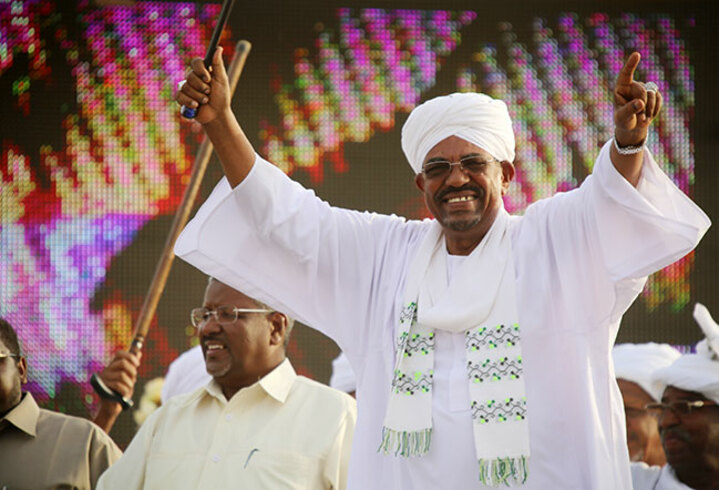Protesters hit Sudan streets to demand long-awaited reforms
The protests in several cities and the capital Khartoum went ahead with security forces deployed in force and despite a tight curfew since April designed to curb the spread of the novel coronavirus.
SUDAN | PROTESTS | REFORMS
Tens of thousands of Sudanese protesters flocked to the streets Tuesday calling for reforms and demanding justice for those killed in anti-government demonstrations that ousted president Omar al-Bashir last year.
The protests in several cities and the capital Khartoum went ahead with security forces deployed in force and despite a tight curfew since April designed to curb the spread of the novel coronavirus.
"Our demands are peace... and justice. We call for economic reform and appointment of civilian governors to states," said a protester in Burri, east of Khartoum.
"This march is to put the revolution back on course."
Bashir was ousted by the military in April 2019 following months-long mass protests against his 30-year rule, in an uprising triggered by economic hardship.

Many on Tuesday chanted the catchphrase of anti-Bashir protests: "Freedom, peace and justice."
Protesters rallied in areas across the country, including in the capital's twin city of Omdurman, with security forces later in the day firing tear gas to prevent protesters from crossing the bridge linking it to Khartoum.
Demonstrations also took place in parts of the war-ravaged Darfur region of western Sudan, where protesters called for Bashir and others accused of war crimes in the region's conflict to be tried at the International Criminal Court.
Sudan has since August been led by a civilian-majority administration presiding over a three-year transitional period.
The post-Bashir administration has vowed to tackle the country's daunting economic woes, largely blamed on the former regime's policies, and forge peace with rebel groups.
The country's political transition came on the back a power-sharing deal between military leaders, who ousted Bashir, and the protest movement.
The agreement was preceded by months of military control, with Tuesday's protests taking place a year after demonstrations calling for the end of military rule, during which at least seven people were killed.
Legitimate demands
Ahead of Tuesday's protests, Prime Minister Abdalla Hamdok said he met with political factions and other groups to discuss their demands.
"These legitimate demands are necessary to put the revolution back on track," he said in a statement on Monday.
He pledged to announce in the coming days several decisions that "may have a major impact" in Sudan.
The premier also called on protesters "to follow health guidelines to prevent the spread of the coronavirus", which has infected more than 9,200 people and killed nearly 600 in the country.
Photos from several rallies showed some demonstrators wearing face masks.
In the northeastern city of Atbara, the launchpad of the December 2018 anti-Bashir protests, crowds carrying the Sudanese flags gathered to call for a "full civilian rule".
In Dongola, north of the capital, hundreds carried banners demanding "retribution" for demonstrators killed in clashes with security forces last year.
At least 246 were killed and hundreds others wounded during the 2018-19 anti-government protests, according to doctors linked to Sudan's protest movement.
"Carry out the reforms, Hamdok, do not fail those who brought you (to power)," protesters in Dongola chanted.
War criminals to the ICC
Tuesday's rallies coincided with the 31st anniversary of the 1989 Islamist-backed military coup that brought Bashir to power.
Since his ouster, the former strongman has been detained and was handed a two-year prison sentence on corruption charges in December.
He faces charges over the deaths of protesters and the 1989 coup.
Authorities in Sudan have launched probes into "violations" committed during his rule.
In Nyala, the capital of South Darfur, demonstrators draped in the Sudanese flag carried banners that read: "Retribution and peace."
Fighting erupted in Darfur in 2003 between African minority rebels and Bashir's forces, leaving 300,000 people dead and displacing 2.5 million others.
A North Darfur resident Ahmed Adam, who was at the rally, said protesters held banners reading "all war criminals to the International Criminal Court".
Bashir has for a decade been wanted by the ICC over alleged war crimes and crimes against humanity in the Darfur conflict.
Forces unleashed by Bashir's government have been accused by rights groups of "ethnic cleansing" campaigns and widespread rape.
In February, Sudan's transitional authorities agreed that Bashir and his aides would stand trial before the ICC.
Earlier this month, top militia leader Ali Kushayb, who was accused of atrocities in Darfur, handed himself over to the ICC.